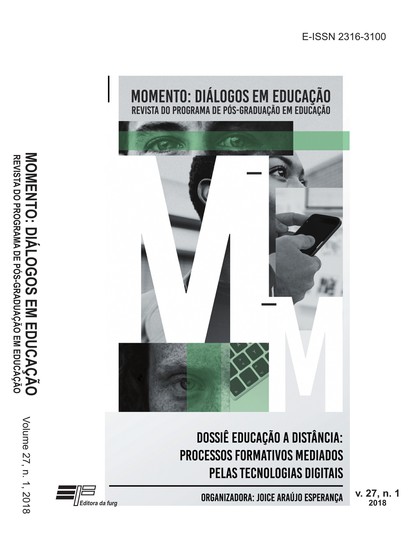Redes de cooperação na EAD – compartilhando soluções e cursos online
DOI :
https://doi.org/10.14295/momento.v27i1.7818Mots-clés :
Plataformas MOOC, Cursos online, Redes educacionaisRésumé
A pesquisa analisa uma proposta teórica que permite articular políticas e programas de EaD da educação profissional, com as soluções técnicas inovadoras de gestão educacional na EaD. Dois fundamentos devem balizar a adoção das tecnologias digitais e dos recursos educacionais. O primeiro, voltado à produção e reuso de materiais como Recursos Educacionais Abertos (REA). A segunda para o uso de suportes educacionais flexíveis, baseados em software livre. O estudo propõe uma solução teórica que aproxima tecnologias educacionais com estratégias políticas de educação, através de plataformas digitais e repositórios educacionais. Modelos integrados podem amparar estratégias políticas que alinhem gestão e modelos pedagógicos com recursos educacionais abertos.Téléchargements
Références
AMIEL, Tel; SOARES, Tiago Chagas. Identifying Tensions in the Use of Open Licenses in OER Repositories. The International Review of Research in Open and Distributed Learning, v. 17, n. 3, 2016.
BRASIL, Ministério da Educação. Rede e-Tec Brasil: Apresentação. Brasília: 2016. Disponível em: <http://portal.mec.gov.br/rede-e-tec-brasil>. Acesso em: 27 mai. 2016.
BRASIL, Ministério da Saúde. UNA-SUS: O que é a UNA-SUS. Brasília: 2018a. Disponível em: <http://www.unasus.gov.br/>. Acesso em 31 jan. 2018.
BRASIL, CAPES. Portal Educapes: Dúvidas frequentes. Brasília: 2018b. Disponível em: < https://educapes.capes.gov.br/redirect?action=faq>. Acesso em 31 jan. 2018.
BRASIL, Ministério da Saúde. UNA-SUS: Acervo de Recursos Educacionais em Saúde (ARES). Brasília: 2018c. Disponível em: <http://www.unasus.gov.br/recursos/ acervo_recursos>. Acesso em 31 jan. 2018.
BRASIL, Ministério da Educação. O que é a plataforma MEC? Brasília: 2018d. Disponível em: <http://portalmec.c3sl.ufpr.br/ajuda/plataforma-mec#plataforma-mec>. Acesso em 31 jan. 2018.
CATAPAN, A., KASSICK, C. N.; OTERO, W. R. I. Currículo Referência para o Sistema e-Tec Brasil: uma construção coletiva. Florianópolis: NEP/UFSC, 2011. Disponível em: <http://www.etec.ufsc.br/file.php/1/cr/index.htm>. Acesso em: 11 nov. 2016.
CATAPAN, Araci. H.; KASSIK. Clovis N. (Orgs.) O processo de gestão institucional na Rede e-Tec Brasil. Coleção Gestão e Docência na EaD, Vol. 1. Florianópolis: NUP/CED/UFSC, 2015. Disponível em: . Acesso em: 11 nov. 2016.
CHROMAKEY. Wikipédia, a enciclopédia livre. Disponível em: <https://pt.wikipedia.org/w/index.php?title=Chroma_key&oldid=47231147>. Acesso em: 11 nov. 2016.
DE WAARD, I.; KOUTROPOULOS, A.; HOGUE, R. J.; ABAJIAN, S. C.; KESKIN, N. Ö.; RODRIGUEZ, C. O.; GALLAGHER, M. S. Merging MOOC and mLearning for increased learner interactions. International Journal of Mobile and Blended Learning (IJMBL), 4(4), 34-46, 2012.
DOWNES, Stephen. Learning networks and connective knowledge. Collective intelligence and elearning, v. 20, p. 1-26, 2006.
EPALE - European Commission. MOOCS, COOCS, VOOCS and SMOOCS. Birminghan: EPALE, 2015.
GONÇALVES, M. F.; TORRES, E.; CHUMBO, I. A.; GONÇALVES, V. M. Massive open online courses (MOOC) na formação contínua de professores: um estudo de caso. Revista Onis Ciência, v. 3, n. 10, p. 5-21, 2015.
HOOSEN, Sarah. Survey on Governments’ Open Educational Resources (OER) Policies. Columbia: Commonwealth of Learning/UNESCO, 2012.
JOHNSON, L.; BECKER, S.; ESTRADA, V.; FREEMAN, A. Horizon Report: 2014 Higher Education. p.1-52, 2014.
MARTINS, C. R. Q.; MENDES, L. F. S.; DUARTE, G.D. Interfaces de repositórios educacionais: dificuldades e possibilidades. Congresso Nacional de Educação: Educere, 12., 2015. Curitiba. Anais. Curitiba: Champagnat, 2015. p.20626-20635.
MATTAR, João. Web 2.0 e redes sociais na educação. São Paulo: Artesanato Educacional, 2013.
MESSINA, L. MOOC in Open Education/HigherEducation: innovazione dirompente o eterotopia? Conferenza EM&EM ITALIA: Teach Different! Genova, 2015.
PAPPANO, Laura. The Year of the MOOC. The New York Times, v. 2, n. 12, 2012.
PECO, P.; LUJÁN-MORA, S. Architecture of a MOOC based on Course Builder. IEEE Information Technology Based Higher Education and Training. IEEE, 2013. p.1-8.
PETERS, Otto. Didática do ensino a distância. São Leopoldo: Unisinos. 2002.
RHOADS, Robert A.; BERDAN, Jennifer; TOVEN‐LINDSEY, Brit. The open courseware movement in higher education: Unmasking power and raising questions about the movement's democratic potential. Educational Theory, v. 63, n. 1, p. 87-110, 2013.
SIEMENS, George. Connectivism: A learning theory for the digital age. International Journal of Instructional Technology and Distance Learning (ITDL), v.2, n.1, 2014.
SILVEIRA, A. S. S., ORTIZ, J. O. S.; RIBEIRO, L. O. O novo paradigma docente no contexto educacional dos MOOCs. Congresso Nacional de Educação: Educere, 12, 2015. Curitiba. Anais. Curitiba: Champagnat, 2015. p. 42195-42211.
SCHNEIDER, C. K.; CAETANO, L.; RIBEIRO, L. O. M. Análise de vídeos educacionais no youtube: caracteres e legibilidade. RENOTE, 10(1), 2012.
SIVAMUNI, Kalaimagal; BHATTACHARYA, Sujoy. Assembling pieces of the MOOCs jigsaw puzzle. In: Innovation and Technology in Education (MITE), 2013 IEEE International Conference in MOOC. IEEE, 2013. p. 393-398.
STUCHLIKOVA, L.; KOSA, A. Massive open online courses-Challenges and solutions in engineering education. In: Emerging eLearning Technologies and Applications (ICETA), 2013 IEEE 11th International Conference on. IEEE, 2013. p. 359-364.
UNESCO/COL. Guidelines for open educational resources (OER) in higher education. Vancouver: Commonwealth of Learning, 2011.
TIFFIN, John; RAJASINGHAM, Lalita. A universidade virtual e global. Porto Alegre: Artmed, 2007.
Téléchargements
Publié-e
Comment citer
Numéro
Rubrique
Licence
À Revista Momento − Diálogos em Educação, ficam reservados os direitos autorais, de todos os artigos nela publicados.


